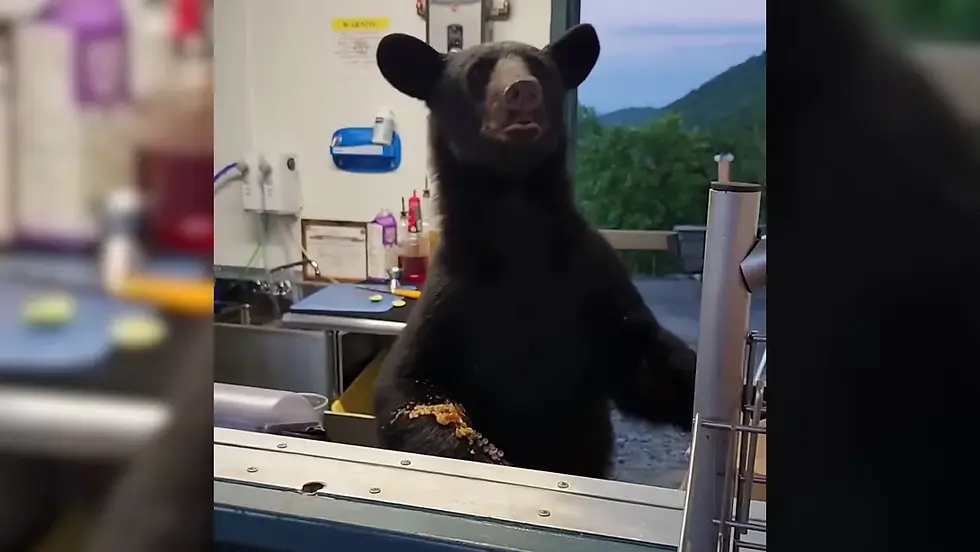How to coexist with Black bears in the Upstate
- Charles Reams

- Jun 12, 2025
- 3 min read
How to coexist with Black bears roaming in the Upstate
Black bears are roaming in the Upstate, but don’t panic because they are foraging for food, not you.
There are no recorded incidents of Black bears killing anyone in South Carolina, authorities say. But we need to be cautious and follow a proven strategy.
1. Secure Food and Garbage:

Remove attractants: Don't intentionally feed bears or other wildlife.
Secure garbage: Use tightly shut or bear-proof trash cans. Don't leave garbage in the open.
Store pet food properly: Keep pet food in airtight containers and feed pets indoors whenever possible. If feeding outside, remove bowls afterwards.
Clean grills: Ensure grills are cleaned and covered after each use to remove food odors.
Bird feeders: Remove bird feeders when bears are active, as birdseed is highly attractive to them.
Beehives: If you have beehives in bear territory, protect them with an electric, bear-proof fence.
2. During an encounter:
Don't panic: Black bears are generally shy and will likely retreat if given the chance.
Don't run: Running may trigger a chase response.
Don't make eye contact: Avoid direct eye contact with the bear.
Make yourself look big: Wave your arms and make loud noises to appear dominant and frighten the bear.
Back away slowly: Gradually create distance between yourself and the bear.
Give the bear an escape route: Don't corner or trap the bear.
If the bear climbs a tree: Keep people and pets away, and it will likely come down and leave when it feels safe.
If the bear is stationary, move away slowly and sideways: This allows you to keep an eye on the bear and avoid tripping, and is non-threatening.
If attacked: If a black bear attacks you, DO NOT play dead. Try to escape to a secure place, fight back vigorously, concentrating blows to the face and muzzle.
3. Report bear activity:
Alert your neighbors: Share information about bear sightings in the area.
Report unusual encounters: Contact SCDNR at 1-800-922-5431 or 911 for black bear emergencies. You can also report black bear sightings online.
4. Exercise Caution with Dogs:
Supervise your pet: Keep dogs on a leash and avoid allowing them to bark at, harass, corner or chase bears.
Check your yard before letting your dog out: Ensure there are no bears present.
By taking these proactive steps and being prepared for potential encounters, you can minimize risks and help ensure peaceful coexistence with black bears in Upstate South Carolina.
Last year, there were 450 black bear sightings in the region, according to the South Carolina Department of Natural Resources. Sightings are on the rise due to increased human activity and development in bear habitat and the use of technology like doorbell cameras, which allow for more sightings to be captured.
But is this reason to be worried about black bears? Not exactly.
"Black bears are so timid today partly because they evolved alongside such powerful predators as saber-toothed cats, American lions, dire wolves, and short-faced bears, all of which became extinct only about 12,000 years ago," said the North American Bear Center. "Black bears were the only one of these that could climb trees, so black bears survived by staying near trees and developing the attitude: run first and ask questions later. The timid ones passed on their genes to create the black bear of today."
Here's what to know about black bears in the state.
What do black bears like to eat?
Black bears are omnivores that eat both plants and animals. Their diet generally consists of berries, nuts, insects, fish, and meat. Because black bears are opportunistic, they will devour anything that is readily available, including human food and garbage. The black bear diet is also highly dependent on season and location.
Offensive black bear attacks are rare and usually occur in remote areas where bears come in contact with humans the least, per the North American Bear Center.
"The 750,000 black bears of North America kill less than one person per year on average, while men 18-24 are 167 times more likely to kill someone than a black bear," the center said.
When a human is attacked by a black bear, it is typically a defensive reaction to the person being too close ― a situation that is easily avoidable. Injuries that occur are usually minor. Since most black bears in the wild today are timid, they are more likely to run away to a tree when frightened.


